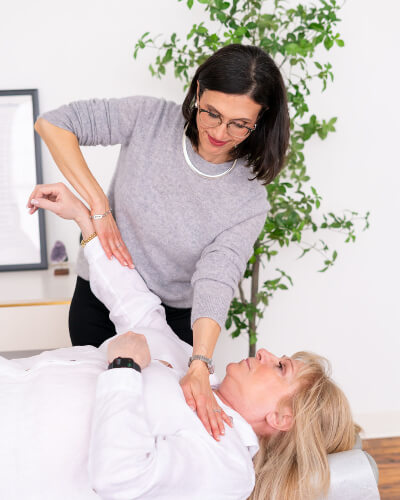Applied Kinesiology in Mahopac
Understanding Applied Kinesiology
 Applied Kinesiology (AK) is a gentle and non-intrusive diagnostic system for evaluating the body’s function. It utilizes muscle response testing, which enlightens AK practitioners about the influence of the nervous system, muscular system, and energetic pathways on an individual’s overall health. Through the nuanced insights gained from muscle testing, AK practitioners can pinpoint areas of imbalance and potential sources of health issues.
Applied Kinesiology (AK) is a gentle and non-intrusive diagnostic system for evaluating the body’s function. It utilizes muscle response testing, which enlightens AK practitioners about the influence of the nervous system, muscular system, and energetic pathways on an individual’s overall health. Through the nuanced insights gained from muscle testing, AK practitioners can pinpoint areas of imbalance and potential sources of health issues.
At its core, AK embodies a philosophy that views the body as a complex, interconnected system where physical, chemical, and emotional factors interplay to shape one’s health.
How AK Supports Health and Well-being
Practitioners of AK strive to restore equilibrium and enhance well-being by addressing these intricate connections. This holistic approach underscores the significance of conducting a thorough examination to uncover and address the underlying causes of illness.
For many individuals struggling with complex conditions, Applied Kinesiology has become a source of encouragement and possibility when conventional treatments have fallen short. Seasoned AK professionals around the globe have successfully tackled a spectrum of issues, including injury, pain, anxiety, depression, fibromyalgia, adrenal fatigue, PTSD, and women’s health concerns. Their adeptness in AK techniques offers relief and fosters renewed optimism among patients.
Why We Are Different
So one of the things that I love about working with Dr. Kennedy is she makes you a partner in your health journey. So the diagnostics of muscle testing will bring out underlying issues. And then she works with the nutritional component of that. So, different nutritional supplements you can take to loosen up the fascia and aid in the day-to-day healing of your body. Cathy Parlitsis
Frequently Asked Questions
How can a simple muscle test be used to determine what is wrong?
AK testing does not measure muscle strength in terms of size or mass, as in a routine check-up, but rather the muscle’s ability to process signals from the nervous system. This approach provides insight into how clearly the brain communicates with the rest of the body.
Why is it necessary to contact various areas during muscle testing?
Additional testing can then be performed to determine the exact nature of the imbalance and guide appropriate care. This method allows practitioners to identify areas that may not be obvious through traditional evaluation alone.
How can a simple muscle test reveal the source of a problem?
Further testing can also identify nutritional or energetic influences. By studying how muscles respond under different conditions, AK practitioners can better understand the root causes of discomfort or dysfunction and provide targeted recommendations to support overall well-being.
Why does it seem like the muscle weakens because the practitioner is pushing harder?
During testing, one side of the body may feel weaker or heavier, and the patient might notice slight tension in another area as the body compensates. This variability is normal and helps practitioners identify imbalances. Over time, patients become more attuned to these subtle changes and can recognize the differences in muscle response.
Do practitioners test other things besides muscles?
Prior reports from other providers are also taken into consideration. This thorough approach ensures patients receive safe, comprehensive care, and if AK is not the right fit, practitioners will recommend the most appropriate next step.
Get Started Today
Dr. Kennedy, a certified Professional Applied Kinesiologist (PAK), is excited to help you alleviate the pain you are experiencing and achieve lasting relief and optimal health. Contact us now to schedule your first visit. Once you begin, typical appointments are about 45 minutes.
CONTACT US
